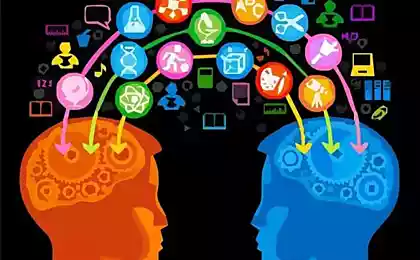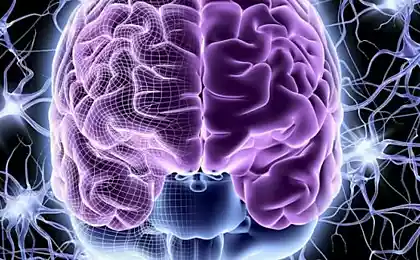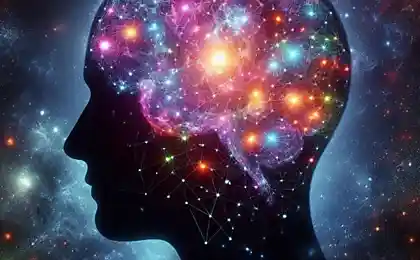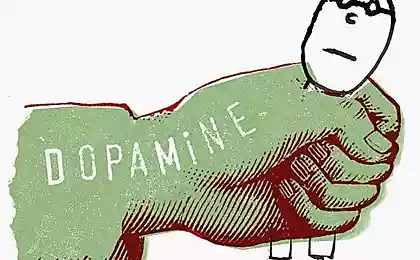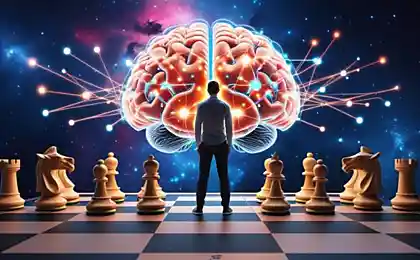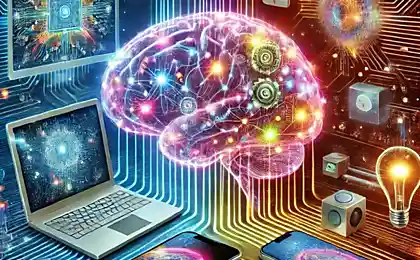540
Vasily klucharev: Even if you know you are being manipulated, you are unconsciously obey
Fifty nine million four hundred fifty nine thousand four hundred forty three
© Alexander Karelin
Neuroscientist Vasily klucharev, head of the Department of psychology, higher school of Economics, conducted an experiment showing the effects of the neurotransmitters on the ability of a person to agree with the majority.
— What is the purpose of your study?
I'm doing neuroeconomics — studying the effect of processes occurring in the brain, decision-making. And my experiment was devoted to the neurobiology of conformism: what processes in the brain cause a person to take the point of view of the group.
We have long wondered in what situation to put our participants, especially because we had to repeat the experiment many times to record brain activity. This limitation of our methods — we can't register changes only once, we need dozens of times to repeat the experience to "pull" signals of brain activity. So, it is necessary many times to put someone in a situation where his opinion differs from the opinions of others.
Dopamine (or dopamine) is a neurotransmitter produced in the brain of humans and animals. It is an important part of the "reward system" of the brain, because it causes a feeling of pleasure, what affects the processes of motivation and learning. Dopamine is produced during the positive experience — for example, sex, eating delicious food, pleasant bodily sensations, as well as drugs associated with them.
In the end, we decided that asking participants to rate the attractiveness of other people. This is an interesting topic because the idea of beauty evolyutsioniruet and vary from person to person, despite the dominant concept of modern psychology that beauty is caused biologically, that all races have the same innate idea of its canons. We decided to take advantage of these features of perception — because the attractiveness of other people greatly affect us and it is a good channel for manipulation.
We had a very simple experiment: the party sees a female face, and shall determine its attractiveness on a scale. While his brain is scanned using MRI. First, the party nominates its rating, and then sees the assessment of the allegedly targeted by the group. And there is a conflict between these two estimates: "I believe that a woman is not very beautiful, and the guys think that she is damn beautiful. What do you do?" We are interested in what is happening at the moment in his mind — to change people their opinion, will not change, can we predict what reactions it will cause in the brain.
— And then you asked the same question again?
The results showed that if the Respondent found out that the group expresses a more positive opinion after an hour he usually changes his rating to a higher one. If the panel finds that the woman is less beautiful than it assesses the subject, it also changes the view in the direction of the views of the group. Moreover, we repeated this study in a month and "suggested" the opinion remained. And if the participant initially matched with the rating of the group, his opinion then has not been changed.
And what processes in the brain caused such a change?
We saw that when a person realizes that he is different, center of recognition of errors in his brain activated a pleasure center is deactivated. Moreover, the more this happens the more likely that people will change the opinion. This is our basic hypothesis. In addition, we had a special method allowing to measure the level of brain activity of the participants before we start asking them questions and as it turned out, in terms of brain activity we could predict people succumb to the influence of the group or not. People who have proved to be more conformal in the experiment, came up with already activated areas in the head.
"Suppose you came to a favorite cafe and ordered my favorite coffee. If he is, as you expected, your brain will not react at all. And if coffee is awful or incredibly tasty, dopamine levels significantly jump". We tried to hold and experiment with magnetic radiation. For this purpose there is a special device — it is a coil with wires, which rapidly turns the current, and the result is a narrow beam of magnetic field, which is sent to the brain. Using a specific sequence of pulses can deactivate a particular area is sufficient to irradiate it to 40 seconds, and within an hour the brain will work in emergency mode. So, when we numb the area, frequency change of opinion compared with the control group reduced by 40%. And we believe that those areas of the brain associated with dopamine. Dopamine is involved in the process of learning, expectation of reward — it's already been proven in the experiments of other scientists.
Button happy?
— Yes, this was an experiment: the button that is connected to electrodes directly stimulating areas of the brain associated with dopamine release. The mouse is connected to the button of happiness, stimulating itself endlessly until you unplug the unit — do not eat, drink or sleep.
But later experiments seems to be confirmed that being connected to "the button of happiness" have not experienced the actual satisfaction is only a haunting sense of expectation of reward.
— If you go to the end, to the most modern concepts of dopamine, the neurotransmitter associated with expectations in General. And our concept is based precisely on this idea. You expect that your opinion is similar to the view of the panel, and for you it is a reward. But if you suddenly find that you are different from others, dopamine is signaling you: whoa, something went wrong, let's change the strategy. Non-conformism is a disaster for our brains. In General, dopamine encodes any error of expectations — and in plus and in minus. Suppose you came to a favorite cafe and ordered my favorite coffee. If he is, as you expected, your brain will not react at all. And if coffee's terrible, or, conversely, incredibly tasty, dopamine levels will noticeably jump. In our project we focused on two areas where a lot of dopamine. One of them is a center error — signals you when the brain feels that you're doing it wrong. And there is the pleasure center, he signals, when all is well.
In their study, you relied on the experience of predecessors?
We took the example of the classic Asch experiment. It's very simple — participants are requested to compare several lines and find two identical. Actually, the correct answer is obvious. But you are placed in a room where there's six people — "decoy" — called the same absolutely other lines. Of course, it's a shock: the man sees the error, but three-quarters of the subjects at least once agreed with the opinion of the majority and gave the wrong answer.

There is another example, scientists have studied the ecology. They found that neither income nor education levels do not influence it: the only indicator that predicts how people will relate to energy savings is the behavior of their neighbors. But when people asked why they do it — they cited any reasons, except this.
Another study was done in Holland. Scientists stuck the stickers to the bikes in the Parking lot and counted how often people throw stickers on the street or consider to the trash. The experiment was played in two situations. One to clean the fence was the inscription: "it is Forbidden to paint the wall." The second wall was already painted by the experimenters.
And people thereby deliberately provoked to be disorderly?
Yes. Accordingly, the result was obvious. In the second case, people litter twice as often just because saw other people also don't follow the norm. Or, for example, I have some good photos that I recently did in Venice. There are two restaurants were nearby — one was Packed full, and the second is completely empty. I stood there and thought: where would I go? It's obviously not empty.
— And what is the meaning of this mechanism from the point of view of survival?
— There is a notion of "genius of the crowd". English psychologist Francis Galton decided to do a little experiment: go to a farmers ' festival, and asked them to determine the weight of an ox on the eye. And the collective decision of the crowd of farmers turned out to be correct, the assessment made by experts. The cumulative opinion of a large number of people is correct, if the set of random people, and they have no systematic bias. And from the point of view of the evolution of the opinion of the majority is better than individual opinion. When a species has many individuals, each trying to prove its strategy — and any attempt is rewarded or punished in the course of natural selection. So most learns the same strategy, only if it is better than others.
— It turns out that non-conformists is an experimental field of evolution?
— Yes, because the old strategies work only in a stable environment. Even if we look at history — in the same nineties most of the solutions were of no use because the situation has changed dramatically. And, because the correct overall trend to pay attention to the opinion of the majority does not adapt to changing conditions, a certain diversity of opinions necessary for humanity. Someone needs to look for new ways.
Is there a way to biologically affect the production of dopamine? If, say, some kind of Orwellian character will want to raise an obedient generation?
Yesterday I had a conversation with Paul Pubic. And he asked me, because many people take antidepressants, and they increase the production of dopamine, does this mean that we are already doing more than conformal? It's an interesting idea. Maybe this gives some opportunities for manipulation. You can use this natural mechanism in specific situations: for example, to show information in the context of increasing dopamine levels. But it is unlikely you can just catch the right person and inject him with a dose of the neurotransmitter and then cause you to make the right decision.
"Scientists have studied people's attitudes to the environment and found that neither income nor education levels do not influence it: the only indicator that predicts how people will relate to energy savings is the behavior of their neighbors. But when people asked why they do it — they brought any cause other than this". Moreover, that any hypothesis should be treated carefully — including to our. So far it works, but perhaps there will be clarification and interpretation. Besides, dopamine is part of many processes in the body, and the change in its level can affect anything — and it's a big risk.
— There is a stereotypical view that the more intelligent and educated a person is, the less he is inclined to "herd instinct."
— Regularities between IQ and conformism no one has yet studied. But to me the study came alone smart girl and in the process realized, "yeah, you're trying to manipulate my opinion". I excluded the result from the study — but had looked at her data and found that it changed their opinion more than anyone. Neuroeconomics gives strange examples of dissonance between mind and behavior: even if you understand what you are trying to manipulate you unknowingly obey.
Moreover, when we believe that we fully control, we do not realize that for us makes the decision environment. Was such a study: the participant was asked to choose one picture out of two, and then the experimenter discreetly substituted selected card from another. And asked the man to explain the choice. Only 26% of the participants actually noticed that the photo changed. The others began to justify a choice that actually did not they — "I like girls", "she's like my sister" and so on.
— You will separately study the people who are inclined to non-conformity?
— We are thinking it over — collect in the polar group of conformists and non-conformists. And generally, I would like to double-check the results of our experiment in real conditions. And we are all the same people put in a pipe and ask them strange questions — agree, not the most natural situation.
— In your opinion, how do we still make decisions — consciously or impulsively?
— Honestly, I'm skeptical. It seems to me that consciousness is mainly responsible for the harmonious perception of the world — tries to reassure, looking for compelling reasons for our unconscious actions. But many of our "conscious" decisions is an illusion and what really happens, nobody knows.published
Source: theoryandpractice.ru
© Alexander Karelin
Neuroscientist Vasily klucharev, head of the Department of psychology, higher school of Economics, conducted an experiment showing the effects of the neurotransmitters on the ability of a person to agree with the majority.
— What is the purpose of your study?
I'm doing neuroeconomics — studying the effect of processes occurring in the brain, decision-making. And my experiment was devoted to the neurobiology of conformism: what processes in the brain cause a person to take the point of view of the group.
We have long wondered in what situation to put our participants, especially because we had to repeat the experiment many times to record brain activity. This limitation of our methods — we can't register changes only once, we need dozens of times to repeat the experience to "pull" signals of brain activity. So, it is necessary many times to put someone in a situation where his opinion differs from the opinions of others.
Dopamine (or dopamine) is a neurotransmitter produced in the brain of humans and animals. It is an important part of the "reward system" of the brain, because it causes a feeling of pleasure, what affects the processes of motivation and learning. Dopamine is produced during the positive experience — for example, sex, eating delicious food, pleasant bodily sensations, as well as drugs associated with them.
In the end, we decided that asking participants to rate the attractiveness of other people. This is an interesting topic because the idea of beauty evolyutsioniruet and vary from person to person, despite the dominant concept of modern psychology that beauty is caused biologically, that all races have the same innate idea of its canons. We decided to take advantage of these features of perception — because the attractiveness of other people greatly affect us and it is a good channel for manipulation.
We had a very simple experiment: the party sees a female face, and shall determine its attractiveness on a scale. While his brain is scanned using MRI. First, the party nominates its rating, and then sees the assessment of the allegedly targeted by the group. And there is a conflict between these two estimates: "I believe that a woman is not very beautiful, and the guys think that she is damn beautiful. What do you do?" We are interested in what is happening at the moment in his mind — to change people their opinion, will not change, can we predict what reactions it will cause in the brain.
— And then you asked the same question again?
The results showed that if the Respondent found out that the group expresses a more positive opinion after an hour he usually changes his rating to a higher one. If the panel finds that the woman is less beautiful than it assesses the subject, it also changes the view in the direction of the views of the group. Moreover, we repeated this study in a month and "suggested" the opinion remained. And if the participant initially matched with the rating of the group, his opinion then has not been changed.
And what processes in the brain caused such a change?
We saw that when a person realizes that he is different, center of recognition of errors in his brain activated a pleasure center is deactivated. Moreover, the more this happens the more likely that people will change the opinion. This is our basic hypothesis. In addition, we had a special method allowing to measure the level of brain activity of the participants before we start asking them questions and as it turned out, in terms of brain activity we could predict people succumb to the influence of the group or not. People who have proved to be more conformal in the experiment, came up with already activated areas in the head.
"Suppose you came to a favorite cafe and ordered my favorite coffee. If he is, as you expected, your brain will not react at all. And if coffee is awful or incredibly tasty, dopamine levels significantly jump". We tried to hold and experiment with magnetic radiation. For this purpose there is a special device — it is a coil with wires, which rapidly turns the current, and the result is a narrow beam of magnetic field, which is sent to the brain. Using a specific sequence of pulses can deactivate a particular area is sufficient to irradiate it to 40 seconds, and within an hour the brain will work in emergency mode. So, when we numb the area, frequency change of opinion compared with the control group reduced by 40%. And we believe that those areas of the brain associated with dopamine. Dopamine is involved in the process of learning, expectation of reward — it's already been proven in the experiments of other scientists.
Button happy?
— Yes, this was an experiment: the button that is connected to electrodes directly stimulating areas of the brain associated with dopamine release. The mouse is connected to the button of happiness, stimulating itself endlessly until you unplug the unit — do not eat, drink or sleep.
But later experiments seems to be confirmed that being connected to "the button of happiness" have not experienced the actual satisfaction is only a haunting sense of expectation of reward.
— If you go to the end, to the most modern concepts of dopamine, the neurotransmitter associated with expectations in General. And our concept is based precisely on this idea. You expect that your opinion is similar to the view of the panel, and for you it is a reward. But if you suddenly find that you are different from others, dopamine is signaling you: whoa, something went wrong, let's change the strategy. Non-conformism is a disaster for our brains. In General, dopamine encodes any error of expectations — and in plus and in minus. Suppose you came to a favorite cafe and ordered my favorite coffee. If he is, as you expected, your brain will not react at all. And if coffee's terrible, or, conversely, incredibly tasty, dopamine levels will noticeably jump. In our project we focused on two areas where a lot of dopamine. One of them is a center error — signals you when the brain feels that you're doing it wrong. And there is the pleasure center, he signals, when all is well.
In their study, you relied on the experience of predecessors?
We took the example of the classic Asch experiment. It's very simple — participants are requested to compare several lines and find two identical. Actually, the correct answer is obvious. But you are placed in a room where there's six people — "decoy" — called the same absolutely other lines. Of course, it's a shock: the man sees the error, but three-quarters of the subjects at least once agreed with the opinion of the majority and gave the wrong answer.

There is another example, scientists have studied the ecology. They found that neither income nor education levels do not influence it: the only indicator that predicts how people will relate to energy savings is the behavior of their neighbors. But when people asked why they do it — they cited any reasons, except this.
Another study was done in Holland. Scientists stuck the stickers to the bikes in the Parking lot and counted how often people throw stickers on the street or consider to the trash. The experiment was played in two situations. One to clean the fence was the inscription: "it is Forbidden to paint the wall." The second wall was already painted by the experimenters.
And people thereby deliberately provoked to be disorderly?
Yes. Accordingly, the result was obvious. In the second case, people litter twice as often just because saw other people also don't follow the norm. Or, for example, I have some good photos that I recently did in Venice. There are two restaurants were nearby — one was Packed full, and the second is completely empty. I stood there and thought: where would I go? It's obviously not empty.
— And what is the meaning of this mechanism from the point of view of survival?
— There is a notion of "genius of the crowd". English psychologist Francis Galton decided to do a little experiment: go to a farmers ' festival, and asked them to determine the weight of an ox on the eye. And the collective decision of the crowd of farmers turned out to be correct, the assessment made by experts. The cumulative opinion of a large number of people is correct, if the set of random people, and they have no systematic bias. And from the point of view of the evolution of the opinion of the majority is better than individual opinion. When a species has many individuals, each trying to prove its strategy — and any attempt is rewarded or punished in the course of natural selection. So most learns the same strategy, only if it is better than others.
— It turns out that non-conformists is an experimental field of evolution?
— Yes, because the old strategies work only in a stable environment. Even if we look at history — in the same nineties most of the solutions were of no use because the situation has changed dramatically. And, because the correct overall trend to pay attention to the opinion of the majority does not adapt to changing conditions, a certain diversity of opinions necessary for humanity. Someone needs to look for new ways.
Is there a way to biologically affect the production of dopamine? If, say, some kind of Orwellian character will want to raise an obedient generation?
Yesterday I had a conversation with Paul Pubic. And he asked me, because many people take antidepressants, and they increase the production of dopamine, does this mean that we are already doing more than conformal? It's an interesting idea. Maybe this gives some opportunities for manipulation. You can use this natural mechanism in specific situations: for example, to show information in the context of increasing dopamine levels. But it is unlikely you can just catch the right person and inject him with a dose of the neurotransmitter and then cause you to make the right decision.
"Scientists have studied people's attitudes to the environment and found that neither income nor education levels do not influence it: the only indicator that predicts how people will relate to energy savings is the behavior of their neighbors. But when people asked why they do it — they brought any cause other than this". Moreover, that any hypothesis should be treated carefully — including to our. So far it works, but perhaps there will be clarification and interpretation. Besides, dopamine is part of many processes in the body, and the change in its level can affect anything — and it's a big risk.
— There is a stereotypical view that the more intelligent and educated a person is, the less he is inclined to "herd instinct."
— Regularities between IQ and conformism no one has yet studied. But to me the study came alone smart girl and in the process realized, "yeah, you're trying to manipulate my opinion". I excluded the result from the study — but had looked at her data and found that it changed their opinion more than anyone. Neuroeconomics gives strange examples of dissonance between mind and behavior: even if you understand what you are trying to manipulate you unknowingly obey.
Moreover, when we believe that we fully control, we do not realize that for us makes the decision environment. Was such a study: the participant was asked to choose one picture out of two, and then the experimenter discreetly substituted selected card from another. And asked the man to explain the choice. Only 26% of the participants actually noticed that the photo changed. The others began to justify a choice that actually did not they — "I like girls", "she's like my sister" and so on.
— You will separately study the people who are inclined to non-conformity?
— We are thinking it over — collect in the polar group of conformists and non-conformists. And generally, I would like to double-check the results of our experiment in real conditions. And we are all the same people put in a pipe and ask them strange questions — agree, not the most natural situation.
— In your opinion, how do we still make decisions — consciously or impulsively?
— Honestly, I'm skeptical. It seems to me that consciousness is mainly responsible for the harmonious perception of the world — tries to reassure, looking for compelling reasons for our unconscious actions. But many of our "conscious" decisions is an illusion and what really happens, nobody knows.published
Source: theoryandpractice.ru
How to drop everything and earn traveling the world
GM is developing a lighting system that is controlled by the driver's view
